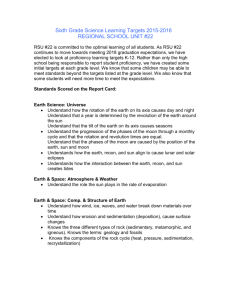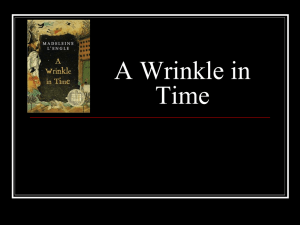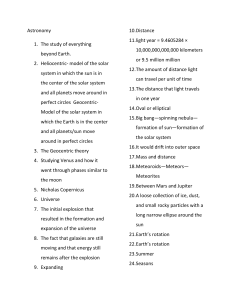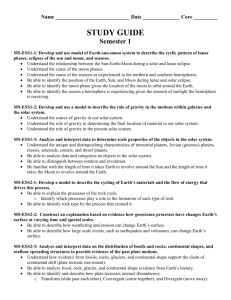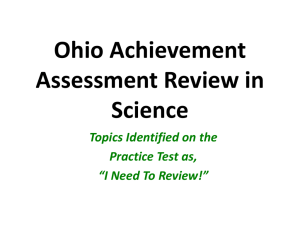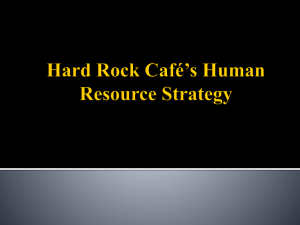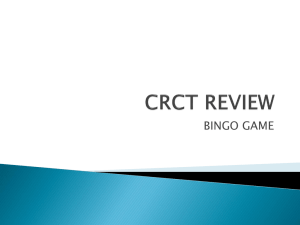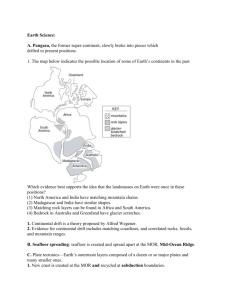Final Volume
advertisement
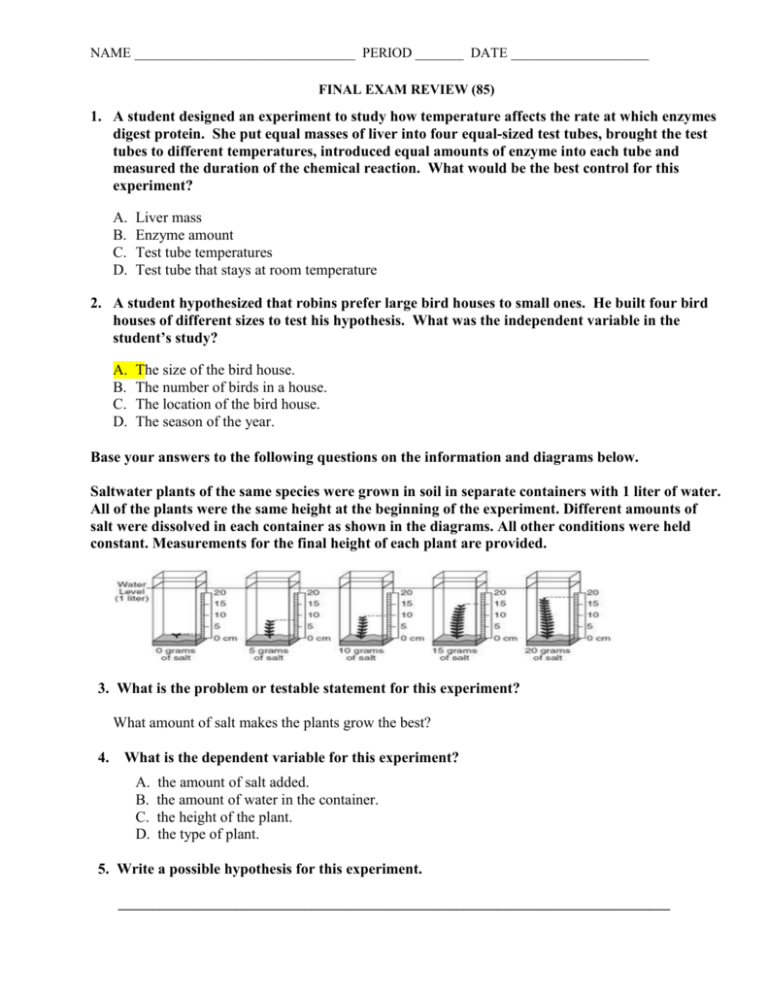
NAME ________________________________ PERIOD _______ DATE ____________________ FINAL EXAM REVIEW (85) 1. A student designed an experiment to study how temperature affects the rate at which enzymes digest protein. She put equal masses of liver into four equal-sized test tubes, brought the test tubes to different temperatures, introduced equal amounts of enzyme into each tube and measured the duration of the chemical reaction. What would be the best control for this experiment? A. B. C. D. Liver mass Enzyme amount Test tube temperatures Test tube that stays at room temperature 2. A student hypothesized that robins prefer large bird houses to small ones. He built four bird houses of different sizes to test his hypothesis. What was the independent variable in the student’s study? A. B. C. D. The size of the bird house. The number of birds in a house. The location of the bird house. The season of the year. Base your answers to the following questions on the information and diagrams below. Saltwater plants of the same species were grown in soil in separate containers with 1 liter of water. All of the plants were the same height at the beginning of the experiment. Different amounts of salt were dissolved in each container as shown in the diagrams. All other conditions were held constant. Measurements for the final height of each plant are provided. 3. What is the problem or testable statement for this experiment? What amount of salt makes the plants grow the best? 4. What is the dependent variable for this experiment? A. B. C. D. the amount of salt added. the amount of water in the container. the height of the plant. the type of plant. 5. Write a possible hypothesis for this experiment. ________________________________________________________________________________ 6. Define atom – USE THE PERIODIC TABLE TO ANSWER QUESTION #7 ________7. Which element has 13 protons, 14 neutrons and 13 electrons? A. Sodium B. Magnesium 8. Match the following : ________ element A. made of 1 kind of atom. C. Aluminum D. Silicon _________ compound B. 2 substances physically combined. __________mixture C. 2 or more elements chemically combined. _______ 9. The unit used to express liquid volume. A. centimeters (cm) _______10. The unit used to express length. B. grams (g) _______11. The unit used to express density. C. grams per cubic centimeter (g/cm3) _______12. The unit used to express mass. D. milliliters (ml) 13. Which instrument is used to calculate: A. balance _______ Mass of an object B. graduated cylinder _______ Volume of a liquid _______ Length of an object 14. Metric conversions: 1cm = _________________ mm C. metric Ruler 23cm = __________________mm 15. _________________________ ________________________ is how to find the volume of an irregularly-shaped object. (Hint: putting it in a graduated cylinder and measuring the difference.) 16. Find the volume of the object using the graduated cylinders below. Final Volume = ___________ Initial volume = ___________ Volume of object = ___________ 17. Using the picture, the mass of the object is ____________ 18. Given the mass from Q. #17 and the volume of the object from Q. #16, what is the density of the object? (D = M/V) _______________ 19. List the jars from the least energetic molecules to the most energetic molecules. Label the states of matter on the diagram below. _________ ___________ ___________ least energetic most energetic A B C 20. Which substance below has the highest density? ________________________ Substance A B C Mass (g) 20 g 15g 25g Volume (ml) 25ml 25ml 25ml 21. Below are examples of physical and chemical changes. Place a Letter P next to the physical changes, and a Letter C next to the chemical changes. _______ rusting metal _______ripping paper _______ salt dissolving in water ______burning wood _______water freezing _______ mixing 2 liquids and a gas evolves. 22. Identify convection, conduction, radiation in the picture below. 23. A renewable resource is one that can A non-renewable resource is one that can cannot be replaced in our lifetime. cannot be replaced in our lifetime. 24. What forms these rock types? _______ Igneous rock _______ Metamorphic rock A. from pieces of other rocks ___________ Sedimentary rock B. by changing existing rocks 25. If an igneous rock cools quickly, it’s crystals will be large C. from cooled molten material or small. 26. Number the following in order from the most permeable (#1) to the least permeable (#4). Silt/mud _____ coarse sand ______ gravel _________ fine sand _____ 27. Scientists get information about the interior of the Earth by studying ________________________ ___________________________ 28. Place the steps from the formation of a sedimentary rock from the first (#1) to the last (#5) step. _____ deposition _____ weathering _____ compaction _____erosion _____cementation 29. Oceanic crust is made of _____________________________ which is _____________________ dense than continental crust. 30. Continental crust is made of __________________________ which is _____________________ dense than oceanic crust. 31. Why were scientists unwilling to accept the continental drift hypothesis? 32. According to the theory of sea-floor spreading: The oldest rocks on the ocean floor are found: closest to The youngest rocks on the ocean floor are found? closest to furthest from furthest from the mid-ocean ridge. the mid-ocean ridge. 33. Which boundary is where plates: convergent divergent transform slide past each other____________________________________________ collide _______________________________________________________ move apart____________________________________________________ 34. What features are found at a convergent boundary? (Check all the fit.) _____ new sea floor _____ mid-ocean ridge _____ trench _____mountain ranges 35. True or False: Most earthquakes and volcanoes occur at plate boundaries because that’s where the plates interact the most. 36. If the difference in arrival times of the P and S waves is far apart, the epicenter is: far away close * Know how to read the chart on page 161 P and S waves and distance to epicenter. 37. True or False: Amount of gases and silica are two factors that cause a volcano to be more explosive than others. 38. Explosive volcanoes have ________________amounts of silica and ______________amounts of gas. 39. _________ wide, gentle sloped volcano A. cinder ________ short, steep-sided cone B. composite ________ tall, well-shaped cone C. hot spot _________ volcano that forms in the middle of a plate D. shield 40. Using a pen/pencil, draw arrows to show how smoke would move if a lit punk was placed in tube A. 41. Why does the air flow in this direction? ______________________________________________________________ A B ______________________________________________________________ 42. Air has pressure because air has ____________________________________. 43. The layers of the atmosphere are divided by ___________________________________. 44. Rank the layers of the atmosphere from highest air pressure (#1) to the lowest air pressure (#4). ______ Thermosphere ______ Mesosphere _____ Stratosphere _____ Troposphere 45. What do the instruments below measure? Barometer __________________________ Thermometer __________________________ Psychrometer _______________________ Anemometer ___________________________ __________ 46. How does burning fossil fuels affect the climate change? A. creating nuclear waste B. by concentrating sunlight C. adding greenhouse gases D. causes earthquakes 47. What is the major source of energy for Earth’s weather patterns? A. gravity B. the sun C. the Earth’s magnetic field D. tides 48. Air masses are determined by ____________________________________ and ______________________________________. 49. Which wind belt moves weather across the United States from the west? Polar Easterlies Prevailing Westerlies Trade Winds 50. Based on the Soil and Water lab: Soil heats up ______________________________ than water. Soil cools off ______________________________ than water. 51. The deflection (turning) of the winds due to the Earth’s rotation is called the ________________________________ ____________________________________ 52. When a liquid changes into a gas it is called condensation evaporation melting When a gas changes into a liquid it is called condensation evaporation melting 53. As the wet and dry bulb temperature get closer together the relative humidity is low high As the wet and dry bulb temperature are far apart, the relative humidity is low high 54. How does a cloud form? Air cools to its _________________ ___________________________. Air masses: maritime tropical (MT) maritime polar ( MP) continental tropical (CT) continental polar (CP) 55. Forms: Over cold land (Canada) ____________________ Over warm oceans _____________________ Over warm land (Mexico) ____________________ Over cold oceans ____________________ Word bank for question 56: Stratus Cumulonimbus Cirrus Cumulus 56. Cloud made of ice crystals ____________________________________________ Puffy clouds _____________________________________ Layered clouds that produce drizzle ____________________________________ Storm clouds _____________________________________ 57. What kind of weather is associated with a low pressure system? fair, cool, dry cloudy, rainy 58. What kind of weather is associated with a high pressure system? fair, cool, dry cloudy, rainy 59. What kind of weather follows a cold front? warm and humid clear skies/cooler/dry 60. What kind of weather follows a warm front? warm and humid 61. clear skies/cooler/dry An isobar or isotherm connects areas of equal temperatures. An isobar or isotherm connects areas of equal pressure. 62. Draw a station model: Air pressure 29.2 inches Air temperature 65° F Dew point temperature 56° F Overcast/cloudy skies .3 inches of precipitation Wind speed: 14 mph Wind direction: southwest 63. Seasons are caused by: ________________________ & _______________________________. 64. When the Earth is tilted towards the sun, the Northern Hemisphere the season is _____________________________________. 65. When the Northern Hemisphere has summer, the Southern Hemisphere has _____________________________________. 66. During a lunar eclipse, the moon is: new moon 1st quarter full moon 3rd quarter 67. During a solar eclipse, the moon is: new moon 1st quarter full moon 3rd quarter D A C B 68. Which 2 positions would the moon be in during a Spring tide? Neap tide? A A B C D B C D 69. As you move from position C to position A, the amount of light on the moon’s surface would: increase decrease stay the same 70. Where are the brightest, hottest stars on the H-R diagram? _______________________________________________ Coolest, dimmest stars? ________________________________________________ 71. Compare Rigel to Sirius B. ____________________________________________ ____________________________________________ ____________________________________________ ____________________________________________ Word bank for 72-74 dwarf star neutron star black hole red giant nebula 72. A star the size of the sun will become a ______________________________ when it dies. 73. A massive star will become either a ________________________________ or ________________________________ at the end of its life cycle. 74. A star begins its life within a ______________________________. Type X Type Y 75. Which galaxy is: _______ irregular Type Z _______ spiral ________ elliptical 76. The spinning of the Earth on its axis is called: revolution rotation 77. The Earth travelling once around the Sun is called: revolution rotation 78. The moon goes through phases because of its around the Earth. revolution rotation 79. Night and day are caused by the Earth’s revolution rotation 80. A planet is kept in orbit around the sun by ________________________________ and __________________________________________. 81. A chunk of rock or metal that orbits in space is a ____________________________________. A chunk of rock or metal that burns up in our atmosphere is a _________________________________. A chunk of rock or metal that hits the surface of the Earth is a _________________________________. 82. As a result of the Big Bang all galaxies are moving: ________away from each other _________ toward each other __________ are stationary
